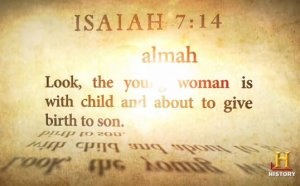Q&A: Is the Virgin Birth a Mistranslation?
From the About page comes this question:
I saw a teaser on the History Channel about a Bible show coming up. They said that the Virgin Birth is a translation mistake. Is this really true?
 The short answer is no, it’s not true. The longer and more interesting answer is that a mistranslation does come into play, but only indirectly.
The short answer is no, it’s not true. The longer and more interesting answer is that a mistranslation does come into play, but only indirectly.
The Bible show is “Bible Secrets Revealed.” (Incidentally, I’ll be in it. More on that later.) And I presume this is the teaser Brian saw: Bible Secrets Revealed: Sneak Peek. About 20 seconds in (not counting the annoying ad), Dr. Francesca Stavrakopoulou repeats a claim she’s made to the BBC in the past: “The idea the Jesus must have been born of a virgin is essentially a mistranslation.” But it’s not.
The text displayed as Dr. Stavrakopoulou speaks is Isaiah 7:14, which originally referred to a young woman even though it is often wrongly translated as “a virgin shall conceive.” The mistranslation as “virgin” dates back to the Greek version of the Bible known as the Septuagint, which renders the Hebrew alma (“young woman”) there as parthenos (“virgin”). It’s not the only place the Septuagint makes this and similar mistakes. But because Matthew (1:23) highlights the Greek here, this mistranslation is well known.
Still, this is a mistranslation of Isaiah 7:14, while the description of Jesus’ virgin birth comes from the Gospels. (I have to assume Dr. Stavrakopoulou knows this, by the way. I wouldn’t want to base too much on the editing that created the teaser.) Matthew 1:18 explains that Mary conceived Jesus before having sex. And Luke 1:34-35 has Mary bearing a child before having sex. These are the passages that describe the virgin birth, and they are both clear and correctly translated.
So no, the virgin birth is not a mistranslation. And even though Matthew references Isaiah 7:14 in mistranslation, the text in Matthew does not depend upon Isaiah, and Luke doesn’t even mention Isaiah.
I have a whole chapter on this in my And God Said: How Translations Conceal the Bible’s Original Meaning, and some summaries on-line: “Who are you calling a virgin?” for example. And I explore why Matthew misquoted Isaiah here: “What Happens to Prophecies in the New Testament?”
12 Comments
Sorry, the comment form is closed at this time.




Dr. Hoffman,
I’ve read that the Septuagint has some translations in it that today we would call “paraphrase.” Do you think it’s possible that the translators of the day let an interpretation or beliefs about word meaning on that portion of text, affect how and why they translated it the way they did from Hebrew to Greek? Thanks!
The interesting thing about Isaiah 7 is that it’s not a Messianic prophecy. It has nothing to do with a messiah. Even Isaiah 9, which seems to be talking about a messiah, when read in context paints a different picture.
In Isaiah 7, 8, & 9, there are three sons talked about being born, each given three names, and each representing a sign from the LORD. The general situation is about Judah going into battle against the Assyrians, and so Ahaz is troubled about it but does not want to seek counsel from God. So Isaiah is sent to give him three signs. The LORD first gives him the sign–Immanuel–God is with us, he is on our side. The second sign is “Maher-Shalal-Hash-Bez,” –the spoils and riches of Assyria will be taken away. And the third sign is “wonderful-counselor-mighty God-everlasting father-prince of peace,” meaning exactly what is says: Take counsel in the LORD; he is more than able to accomplish what he sets out to do; He is the everlasting God–the ruler of all creation–and he will bring about peace. Verse 7 of Isa. 9 goes on to talk about how God will establish his kingdom through Israel, on the throne of David, that he is their God and king and no man, and that the LORD himself shall do all that he has said, by his own will.
Dr. Hoffman,
I’ve seen enough of the History Channel to know that its reliability is very variable. For example, they ran a lot of fearmongering shows about the year 2012.
I have seen legitimate and rigorous scholars portrayed as lending credence to ideas that are neither legitimate or rigorous. Interviews appear to be edited to fit the director’s personal theories. Yet other of their documentaries appear to be very credible.
So I’m curious: why do you agree to appear in these shows? And since you’ve now had a chance to see the finished product, do you think they fairly represented your ideas?
By “these shows” I assume you mean “these episodes of this show.”
I agreed because the premise of the show was that it would be a response, in part, to some of the less informed shows they aired in the past. In fact, I was invited to join the show because of my criticism of the History Channel’s “The Bible.”
As soon as I have a minute, I plan to write up my response in more detail, but in short: I’m glad I was part of the project. It was fun. I met some wonderful people. And, from what I’ve seen, I think the final product is really no less accurate than most newspaper articles. I know that’s not a hugely high standard, but most prime-time TV shows fall far short of it.
I’ve only found one spot where they apparently distort my view, by combining two segments in a way that puts one of them in the wrong context. (I actually haven’t seen all of the episodes in their entirety, so there may be more, but the People on the Internet are pretty good at writing to me when something looks wrong.)
I came across your ted talk on youtube as I was trying to find answers to my Bible inquiries concerning a most accurate translation. Your talk led me to your blog, in which I came across this article. I happened to spend my entire day yesterday looking up this very topic about Isaiah 7:14 and the virgin mistranslation. Your knowledge has blessed me and I will continue to come back and read your posts as references and guides to my own studies. Thank you for this blog and I hope you continue to use it actively.
I had heard that the word “parthenos” meant something like, “woman who chose her own husband”, since marriages were generally arranged in that period. Is this true, or was I misinformed?
It’s new to me.
Thank you for the reply!
Hi! I just wanted you to know that i love your work on this show and i saw your views to be very informative. Here’s my question. With all the studying you’ve done in theology does it bother you that most Christians will find a way to say what your doing is defaming the word of God? No matter how much proof you may have that things didn’t happen the way people may think does it bother you that they just look at you as a antichristian
That hasn’t been my experience. I lecture widely to Christian audiences, and I’ve found that most people are eager to learn more.
Why are you using Matthew and Luke as some kind of proof when they were not even a part of the old testament but added to the book centuries later?
Matthew never says that Mary was pregnant without sex. He only says that the fetus Mary is carrying is “from” the Holy Spirit. As in English, the preposition has several nuances, of which “caused by” is only one. And even if “caused by” is what Matthew meant, that does not definitively say “virgin” conception, since God (presumably) can “cause” any specific pregnancy, even those accomplished the old-fashioned way. Luke, likewise, says only that Mary “will [note the tense of the verb] be with child,” without saying anything about when or how. The “virgin conception” idea is the brain-child of late-first, early second-century Christian thinkers as they began developing the notion of “divinity” for Jesus.We should also note that Matthew and Luke tell very different “nativity” stories, calling into question the historicity of either or both.